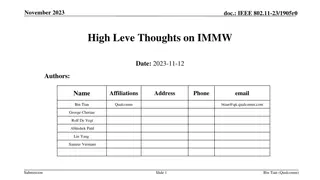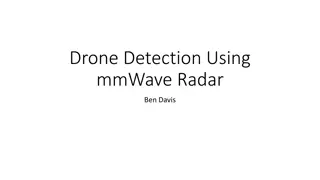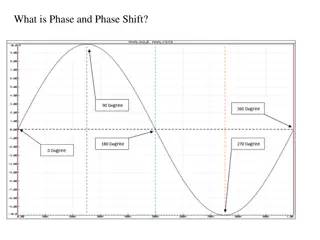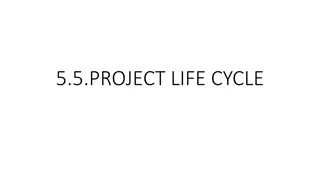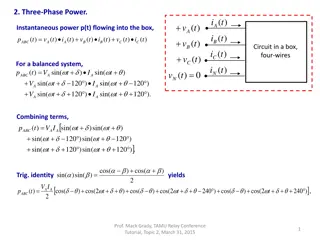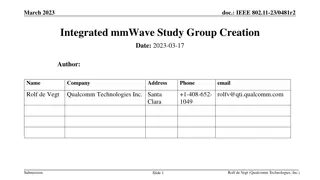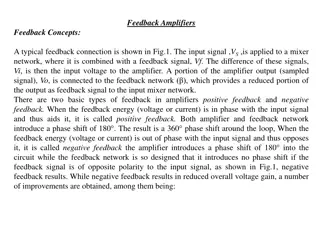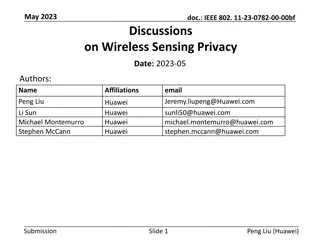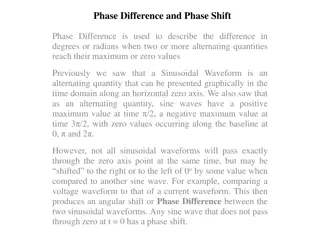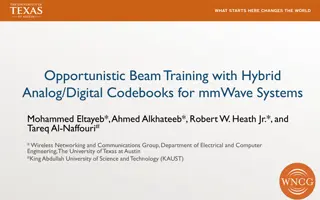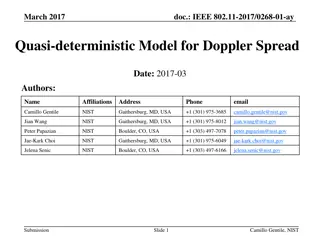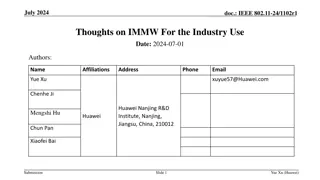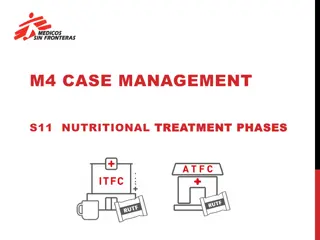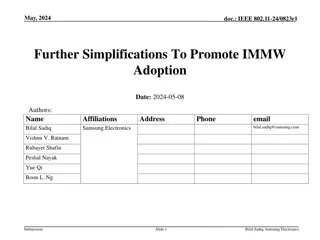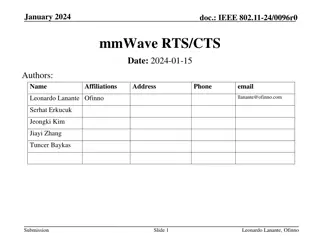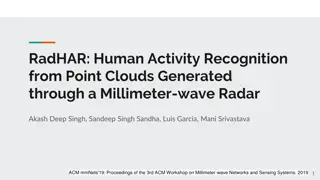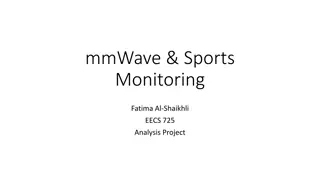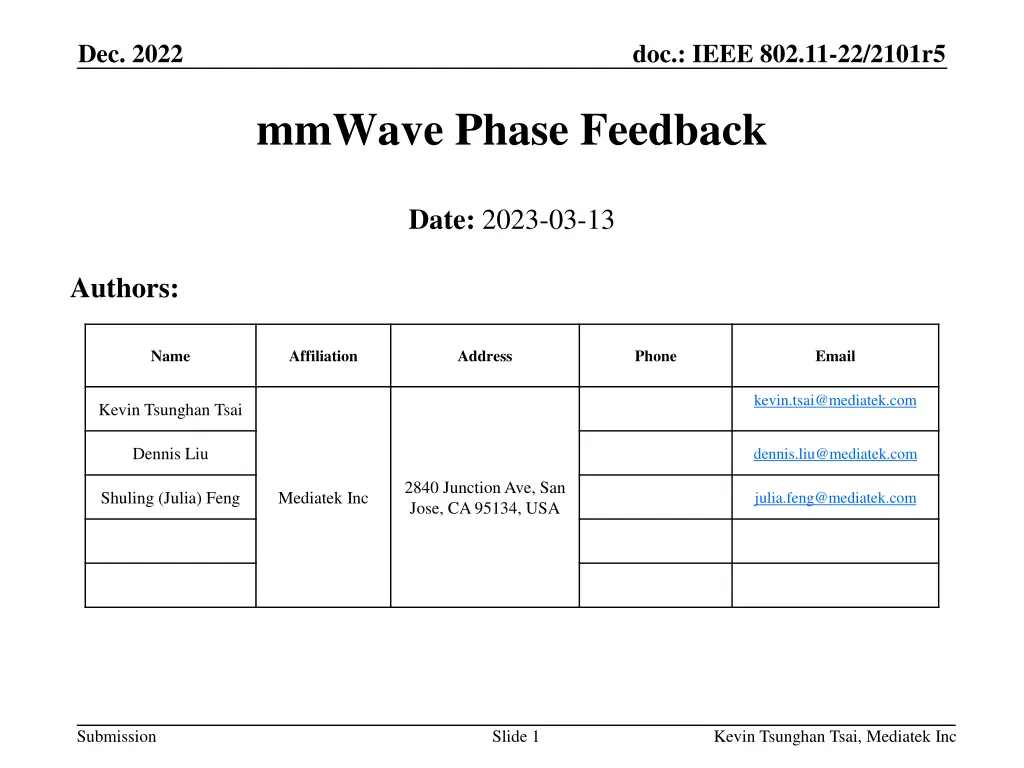
Vital Signs Detection Using Radar Technology
Explore the innovative method of vital sign detection through radar technology, focusing on breathing and heart rate measurements. This detailed document discusses the utilization of phase feedback for precise vital sign monitoring, offering valuable insights into remote diagnostic applications and signal variations for enhanced detection accuracy.
Download Presentation

Please find below an Image/Link to download the presentation.
The content on the website is provided AS IS for your information and personal use only. It may not be sold, licensed, or shared on other websites without obtaining consent from the author. If you encounter any issues during the download, it is possible that the publisher has removed the file from their server.
You are allowed to download the files provided on this website for personal or commercial use, subject to the condition that they are used lawfully. All files are the property of their respective owners.
The content on the website is provided AS IS for your information and personal use only. It may not be sold, licensed, or shared on other websites without obtaining consent from the author.
E N D
Presentation Transcript
Dec. 2022 doc.: IEEE 802.11-22/2101r5 mmWave Phase Feedback Date: 2023-03-13 Authors: Name Affiliation Address Phone Email kevin.tsai@mediatek.com Kevin Tsunghan Tsai Dennis Liu dennis.liu@mediatek.com 2840 Junction Ave, San Jose, CA 95134, USA Shuling (Julia) Feng Mediatek Inc julia.feng@mediatek.com Submission Slide 1 Kevin Tsunghan Tsai, Mediatek Inc
Dec. 2022 doc.: IEEE 802.11-22/2101r5 Introduction Vital sign det. includes breathing rate and heart rate detection and can be used in many health applications Vital sign is one of 11BF use cases [1] Health case - remote diagnostics measurements of breathing rate, heart rate etc. AP: Initiator feedback feedback feedback STA1 STA2 STA3 detection detection detection Submission Slide 2 Kevin Tsunghan Tsai, Mediatek Inc
Dec. 2022 doc.: IEEE 802.11-22/2101r5 Vital Signs Detection by Phase Chest up and down is a small distance variation Small distance variations cause signal traveling different distances and result in phase variations at target bin Hence, we propose to add target bin phase as a report type for vital sign detection exhale ? Distance ???????? = ? ? + ?0 ?0 inhale ? tim e ??= ?? ? ? + ?0 ?? C ,?0 ?(?) ?? Freq ?? TX chirp RX chirp FMCW Find the variation period of target bin can get breathing rate time FMCW ????????? ??????? ? frame0 frame1 Mag. frame2 Mag. frame3 Phase of ?? bin ?0 Mag. exhale ? Mag. 2???? + Phase= 4? ?0+ ? ? Phase= 4? ?0 ? Phase= 4? ?0 ? ? Phase= 4? ?0 ? 4? ? ? +?0 , ??=2?(? ? +?0) velocity ? ??? velocity velocity velocity inhale 2??0 ??? , ?0 ?(?) ? ???=4? ? ? +?0 ?0=4? ?0 , ?=4? ? ? ? Range Range Range Range time ?? ?? ?? ?? ? Submission Slide 3 Kevin Tsunghan Tsai, Mediatek Inc
Dec. 2022 doc.: IEEE 802.11-22/2101r5 Vital Signs Detection by Phase[2] This page describe the equation for radar T/Rx Signal for next page s The transmitted signal of the FMCW radar can be expressed as ? ???2+ ? ? ??? = ???cos 2???? + ? ?? is the starting frequency of the chirp signal, ? is the bandwidth, ?TX is the amplitude of the transmitted signal, ?(t) is the phase noise, ??is the width of chirp signal pulse The distance from the chest to the radar is ? ? = ?, ? ? is the motion displacement of the chest ,d0 is the distance from the radar sensor to the human body ,and the time delay is ??= ?(?) ,where c is the light speed. Then, the received signal is 2?(?) ?,causing by the distance ? ??? ?? 2+ ? ? ?? ??? = ??? cos 2???? ?? + ? Submission Slide 4 Kevin Tsunghan Tsai, Mediatek Inc
Dec. 2022 doc.: IEEE 802.11-22/2101r5 Vital Signs Detection by Phase[2] The echo signal and the transmission signal are mixed by two orthogonal I/Q channels, and then passed through a low-pass filter to obtain an IF signal ? ???? 2+ ? ? ? ????? + 2?????+ ? ???? = ??????? ? 2? ??????? ? 2?2??0 ???? +4? ? ? +?0 ??????? ? 2? ? ????? + 2?????+ ? ? = ? ??????? ? 2???? + ?(?) Detect ?? can get distance ?0 ?(t) varies with R(t) phase varies with R(t), the displacement of chest R(t) will be very small, and it approximates a constant in a single chirp Multiple chirps should be transmitted in sequence to obtain the chest displacement information, which is equivalent to sampling R(t) Submission Slide 5 Kevin Tsunghan Tsai, Mediatek Inc
Dec. 2022 doc.: IEEE 802.11-22/2101r5 Vital Signs Detection by Phase[2] Breathing Detection test Using phase variation to calculate breathing rate Breathing rate~=17 per min FFT Submission Slide 6 Kevin Tsunghan Tsai, Mediatek Inc
Dec. 2022 doc.: IEEE 802.11-22/2101r5 Breathing rate detection by doppler? Breathing rate is 0.1-0.6 Hz (6-36 times per minute) [3][4] Chest displacement due to respiration between 0.004 and 0.012m[3] Assume it need resolution 0.004m/sec to detect respiration rate If we use 40us chirp and 1ms interval per chirp, Vres= /2Tf=C/Fc/2Tf=3e8/60e9/(2*1e- 3*1024)=0.0024m/s Vmax= /4Tc=C/Fc/4Tc=3e8/60e9/(4*1e- 3)=1.25m/s It need 1.024 sec to get a measurement for such high resolution , it can only detect rate< 0.5Hz (Breathing rate is 0.1-0.6 Hz ) 0.004? inhale ? ??? ???????????? time (sec) 0 1 2 3 4 ? = ? sin 2??? -0.004? exhale inhale 0.004?/? ????????? time (sec) 0 1 2 3 4 ? =?? ??= ? cos 2??? -0.004?/? exhale Example for respiration rate 0.25Hz Submission Slide 7 Kevin Tsunghan Tsai, Mediatek Inc
Dec. 2022 doc.: IEEE 802.11-22/2101r5 Heart rate detection by doppler? Heart rate is 0.8 3 Hz(60 to 180 times per min)[3][4] Chest displacement due to Heart rate alone ranges between 0.0002 and 0.0005 m[3] Assume it need resolution 0.0002m/sec to detect heart rate If we use 40us chirp and 1ms interval per chirp, Vres= /2Tf=C/Fc/2Tf =3e8/60e9/(2*1e-3*16384)=0.00015m/s Vmax= /4Tc=C/Fc/4Tc=1.25m/s It need 16.384 sec to get a measurement for such high resolution ,so it s impossible to be used to detect a 0.8~3Hz signal (Heart rate ) Using phase to detect heartbeat don t need such high velocity resolution, hence it can detect higher freq. signal 0.0002? ? ??? ???????????? time (sec) 0 1/4 2/4 3/4 1 ? = ? sin 2??? 0.0002? exhale inhale 0.0002?/? ????????? time (sec) 0 1 1/4 2/4 3/4 ? =?? ??= ? cos 2??? -0.0002?/? Example for Heartbeat 1Hz Submission Slide 8 Kevin Tsunghan Tsai, Mediatek Inc
Dec. 2022 doc.: IEEE 802.11-22/2101r5 Summary Vital sign detection is one of 11BF use cases Need range bin phase to detect vital sign Propose to add phase report in (E)DMG report elements for vital sign detection Add phase report in image report or target report Submission Slide 9 Kevin Tsunghan Tsai, Mediatek Inc
Dec. 2022 doc.: IEEE 802.11-22/2101r5 Signaling During sensing measurement setup, let responder know the need of phase feedback Add option 7 and 8 for reporting both power and phase Avoid confusion ,add wording Power for original option 2~6 Table 9-401v Report Type subfield definition Value 0 1 2 3 4 5 6 7 8 9 10-255 Value Description No report CSI DMG Sensing Image Direction Power DMG Sensing Image Range-Doppler Power DMG Sensing Image Range-Direction Power DMG Sensing Image Doppler-Direction Power DMG Sensing Image Range-Doppler Direction Power DMG Sensing Image Direction Power and Phase DMG Sensing Image Range-Direction Power and Phase Target Reserved Description Submission Slide 10 Kevin Tsunghan Tsai, Mediatek Inc
doc.: IEEE 802.11-22/2101r5 Phase Report for Vital Sign Detection An indicator for phase report Figure 9-1002cc DMG Sensing Image Report Data element format Subelement ID Length Data Block SN Axis Present Reflection Power Bias Reflection Power Slope Octets: 1 1 1 1 1 1 Number of Reflection Subelements Reflection Subelements Reserved Octets: 3 variable variable Figure 9-1002cd Axis Present field format B0 B1 B2 B3 B4 B5 B7 Range Axis Present Doppler Axis Present Receiver Beam Index Present Transmitter Beam Index Present Reflection Phase Present Reserved Bits: 1 1 1 1 1 3 Submission
Dec. 2022 doc.: IEEE 802.11-22/2101r5 Phase Report for Vital Sign Detection Axis #1 Axis #2 Reflection Power Reflection Phase Bits: S1 S2 12 12 Figure 9-1002ce Reflection subelement format for 2 axes Axis #1 Axis #2 Axis #3 Reflection Power Reflection Phase Bits: S1 S2 S3 12 12 Figure 9-1002cf Reflection subelement format for 3 axes Axis #1 Axis #2 Axis #3 Axis #4 Reflection Power Bits: S1 S2 S3 S4 12 Figure 9-1002cg Reflection subelement format for 4 axes Submission Slide 12 Kevin Tsunghan Tsai, Mediatek Inc
Dec. 2022 doc.: IEEE 802.11-22/2101r5 SP1 Do you agree to add the following to 11bf SFD: The 11bf amendment shall add an option to report phase in image report Y N Abstain Submission Slide 13 Kevin Tsunghan Tsai, Mediatek Inc
Dec. 2022 doc.: IEEE 802.11-22/2101r5 SP2 Do you agree to add the following to 11bf SFD: Add two more options in Table 9-401v Report Type subfield definition Option 7 :DMG Sensing Image Direction Power and Phase Option 8 :DMG Sensing Image Range-Direction Power and Phase Add wording Power in option 2~6 Y N Abstain Table 9-401v Report Type subfield definition Value 0 1 2 3 4 5 6 7 8 9 10-255 Value Description No report CSI DMG Sensing Image Direction Power DMG Sensing Image Range-Doppler Power DMG Sensing Image Range-Direction Power DMG Sensing Image Doppler-Direction Power DMG Sensing Image Range-Doppler Direction Power DMG Sensing Image Direction Power and Phase DMG Sensing Image Range-Direction Power and Phase Target Reserved Description Submission Slide 14 Kevin Tsunghan Tsai, Mediatek Inc
Dec. 2022 doc.: IEEE 802.11-22/2101r5 SP3 Do you agree to add the following to 11bf SFD: Use B4 in Axis Present field format to indicate Reflection Phase is presented or not Add one option field Reflection Phase in Reflection subelement format for 2 axes and 3 axes, the number of bits is 12bits Y N Abstain Submission Slide 15 Kevin Tsunghan Tsai, Mediatek Inc
Dec. 2022 doc.: IEEE 802.11-22/2101r5 Reference [1] 11-20-1712-01-00bf-wifi-sensing-use-cases [2] Y. Wang, W. Wang, Mu Zhou, A. Ren, Z. Tian, Remote Monitoring of Human Vital Signs Based on 77-GHz mm-Wave FMCW Radar , Sensors, 2020 [3] D. Obeid, S. Sadek, G. Zaharia, and G.E. Zein, Doppler radar for heartbeat rate and heart rate variability extraction , E-Health and Bioengineering Conference (EHB), 2011 [4] M. Alizadeh, G. Shaker, J. C. M. De Almeida, P. P. Morita and S. Safavi-Naeini, "Remote monitoring of human vital signs using mm- wave fmcw radar", IEEE Access, 2019. [5] IEEE 802.11BF D1.0 Submission Slide 16 Kevin Tsunghan Tsai, Mediatek Inc


